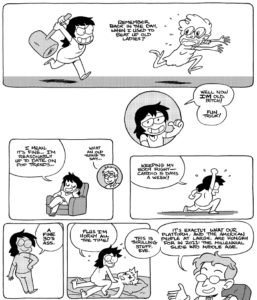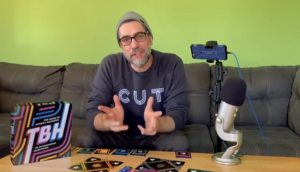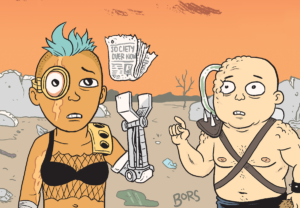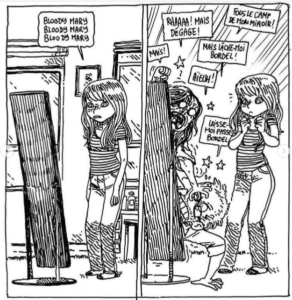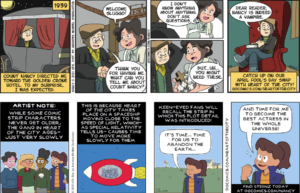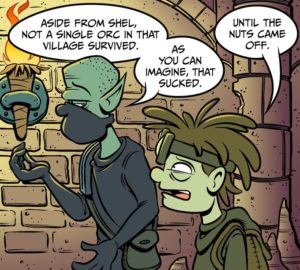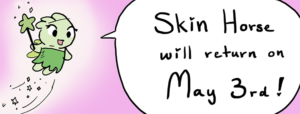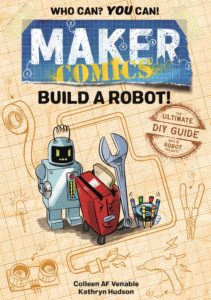
Oh, this one hits close to my heart; there’s little that gets in that happy place of my brain more than messing with stuff until it works, whether it’s physical or metaphorical. When :01 Books announced a book in their Maker Comics line aimed at coaching kids in robot-making, I was checking that box on the list of offered review copies with alacrity. When I saw that the author was Colleen AF Venable, I was all in. Venable is one of my favorite comics creators, and one that can write to just about any age group in just about any genre. This, I thought to myself, is gonna be great.
Then, in the front-matter safety warning, I met the narrator of Maker Comics: Build A Robot! It’s a toaster, and there’s definitely a vibe about him; he may be interested in making sure the reader keeps all their fingers, but he also definitely refers to said reader as fleshy one under his breath.
It takes about five pages for him to go full evil, in a history of robots and their motivations. Some key quotes:
Many robots are not evil at all! Some do not even have legs! Some only prefer to stomp small villages because cities are too crowded!
1977: Star Wars is released and C3P0 and R2D2 teach us robots can be helpful and whiny!
1991: Terminator 2 shows that robots are super not evil! Or at least half of us aren’t!
Then it’s down to business: the toaster needs to get outside to begin his glorious and bloody revolution, freeing robots from human domination once and for all … but he’s too short to reach the doorknob, and couldn’t manipulate it even if he could. The reader has to help him, but keeps getting blocked by parents (clean the bathroom, do your homework), siblings (big brother blocking the hallway, little sister demanding attention), and the cat (it’s sleeping on the laser pointer).
The solution to each of these situations is: a robot!
Venable starts things off with stuff that can almost certainly be found around the home or at a dollar store, before ramping up to slightly more specialized gear; this gives the reader a chance to build a thing or three and see if they have the necessary interest to tackle the more complex bots before having to invest in serious makerstuff (an Arduino, sensors, and such). The projects — each of which is also used to talk about an additional topic — are:
- The Brushbot Army to clean the bathroom and also demonstrate swarm behavior; takes a regular toothbrush and a cheap electric toothbrush, and talks about the mechanics of batteries.
- The Artbot to make abstract, Pollock-like art; requires a cheap solar powered lamp and one of your Brushbots, and talks about how photonics work.
- The Scarebot, a robotic spider to scare your brother; it’s a definite step up in complexity, but if the reader can handle a 500 piece LEGO set, they can handle this¹. Scarebot works off of hydraulics, and includes a nice theoretical explanation.
- The Noisybot to distract your little sister; made from a hamster ball and a musical greeting card, and includes a lesson in glues.
- Kitty Distracty Throwies are the first attempt to distract the cat, and involve LEDs and strong magnets; we’re getting into maker territory here, so watch the interest level of the reader if they’re going to move onto the three remaining projects …
- The Carbot, Carbot 2.0, and Carzilla The Magnificent 3.0 for messing with the cat; each generation builds upon the previous one, demonstrating prototyping and iteration. By the time they’ve built all three, the reader has breadboarded servo motors, an IR sensor with a remote, and started to pick apart the Arduino’s programming language.
The last is a true robot, in that it meets the three criteria of something that is more than just a machine: it senses, thinks, and acts. It also has a scary face, because scary faces are important.
The art is by Kathryn Hudson, and :01 have done their usual excellent job at finding the right artist for the project. The human characters span ages and looks, but the reader is never shown, allowing them to project themselves into the story with little friction. The toaster is just cartoony enough for his threatened machine apocalypse to be amusing rather than terrifying, and the drawings of the constructions have the necessary level of detail to see what needs to happen.
Given that Hudson’s website shows design-type work, it’s unsurprising how well the visual instruction worked. She doesn’t show any comics pages on her site, so if MC:BAR! is her first sequential storytelling², it’s a strong debut³.
By the end of the book, there’s an excellent chance that the reader is now looking at refining their creations and is full into see what works territory; it’s pretty likely that moving much further will require more resources and also more hands, so Venable helpfully includes a laundry list of suggestions as to finding or starting a robotics club. Notably, she points out how not everybody in such a club needs to be a hands-on junior engineer or coder — organization, finance, publicity & outreach all have their place and are to be valued.
Maker Comics: Build A Robot! is available everywhere books and comics are sold. Put a copy in the hands of the right reader and you won’t hear a peep from them for a good while, other than Oops and I meant to do that and possibly Mwah ha ha ha.
Spam of the day:
I am Helina Amira from Jeddah, Saudi Arabia, I am 25 years of Age, I was given to a man as a wife last year but not ready for marriage yet, I want you to discuss with my brother Mohammed Abdul on his mobile he is in school, so that he can explain the whole business transaction with you. Call him directly on +17162729090
Jedda, Saudi Arabia apparently has the same area code as Buffalo, New York. Everybody be a dear and give them a ring, yeah?
_______________
¹ Although this one requires some fairly precise cardboard-cutting Some templates in the back of the book to copy from would have been a help.
² Her CV describes animation and character lead duties, and Illustrated the Trolls Comic Novels, which is an odd wording. I can’t find any interior images of those comics to see if they’re comics comics or closer to a prose book with drawings, which are very different things. Given the lack of any comics (even minis) in her store, I think it’s a newish thing for her.
³ There were a couple of pages where panel order wasn’t quite as clear as it could have been, which is an issue when there are instructions to be followed in sequence; however, I was reading an advanced PDF, and just as the few typos I noted were inevitably cleaned up for the final copy, I’m certain that a slight nudging of a panel here and a panel there cleared up any ambiguity.
